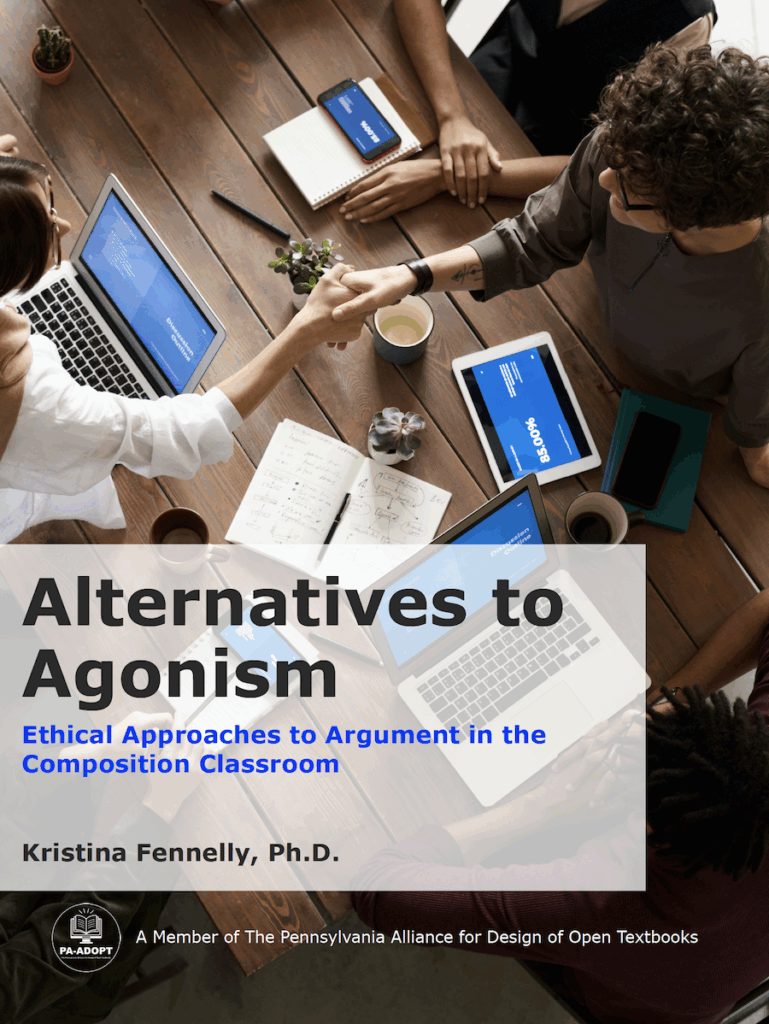Alternatives to Agonism: Ethical Approaches to Argument in the Composition Classroom
by Kristina Fennelly, Ph.D.
Keywords: Adversarialism, Rhetoric, Deliberation, Ethics, Argument

About the Book
This textbook urges students to reconsider traditional notions of argument by inviting them to explore non-adversarial approaches to the arguments that structure their academic and every day lives. After briefly exploring familiar aspects of the “argument culture”—a pervasive, warlike approach to polarizing issues—the textbook turns its attention to unearth more constructive approaches based in listening rhetoric, feminist rhetoric, Rogerian rhetoric, empathy, respect, civility, and an overall ethical treatment of argument. Using the context of a town hall meeting, students are guided in practicing deliberation, investigation, and content analysis of arguments that play out in public social media forums. Chapters feature class discussion exercises, sample essay assignments, and links to relevant Ted Talks, podcasts, and other multi-media sources. The textbook concludes with reflection pieces written by Kutztown University students, alumni, faculty, and staff who all seek to answer the prevailing question of this textbook: “What does it mean to be a worthy arguer?”
Chapters
- Chapter One: The Current State of Argument
- Chapter Two: The Model of a Town Hall Meeting: Meeting Divisive Rhetoric with a Community of Minds
- Chapter Three: The Listening-Oriented Writer: How the Expressive Voice, Feminist Rhetoric, & Rogerian Rhetoric Can Teach Us to Listen and Respond
- Chapter Four: Social Media Writing as Public Sites of Deliberation
- Chapter Five: Embracing Leadership: Student Writers as Moderators
- Chapter Six: What Does It Mean to Be a Worthy Arguer?
- Works Cited
- Appendix
General Information
- Publication Year: 2025
- Edition: First
- Subject: English/Composition
- Latest File Update: December 2, 2025
License

This work is licensed under a Creative Commons Attribution-ShareAlike 4.0 International License (CC BY-SA 4.0) as a part of PA-ADOPT, except where otherwise noted.
Usage
Readers
The eTextbooks created as a part of this program are provided in two formats: ePub and PDF. Please refer to our Reader Support section for guidance on which format may be best for you and the device(s) you use.
Instructors
If you are an instructor seeking to use this eTextbook in your own course(s) please feel free to download the ePub and/or PDF file(s) for your use, but make sure to complete our eTextbook Usage Survey (this information is used for program evaluation purposes).
If you are interested in making revisions and edits to this eTextbook please note that this is possible since the book is under a Creative Commons License, which allows you to remix, reuse, revise, and redistribute the eTextbook. Please refer to the Faculty Support Page, specifically looking at Remixing. You can download Alternatives to Agonism: Ethical Approaches to Argument in the Composition Classroom Apple Pages File in order to use the original document to revise and remix the eTextbook for your purposes.
Citations
MLA: Fennelly, Kristina. Alternatives to Agonism: Ethical Approaches to Argument in the Composition Classroom. First, The Pennsylvania Alliance for Design of Open Textbooks (PA-ADOPT), 2025.
APA: Fennelly, K. (2025). Alternatives to agonism: Ethical approaches to argument in the composition classroom (1st ed.). The Pennsylvania Alliance for Design of Open Textbooks (PA-ADOPT).
Chicago: Fennelly, Kristina. Alternatives to Agonism: Ethical Approaches to Argument in the Composition Classroom. 1st ed. The Pennsylvania Alliance for Design of Open Textbooks (PA-ADOPT), 2025.
Peer Review
This eTextbook went through an Open Peer Review process. The peer review process used the Open SUNY Textbook Peer Review Guidelines, allowing peer reviewers to read the text carefully and evaluate the following:
- Educational Significance of Content including accuracy, appropriate and useful materials, valid and significant concepts, models, and skills, and key elements;
- Effectiveness as a Teaching Resource including a clear explanation of the concepts, alignment of materials to the learning process of the target audience, and alignment of the learning objectives with course goals; and
- Readability and Ease of Use including clarity and comprehensiveness, consistent writing style, readability and ease of use (logic, sequence, and flow), appropriateness for target readership level, and quality of Interactivity and multimedia learning objects.
As a part of the open peer review process, the public review conducted by Dr. Moe Folk is made available: Peer Review Document (PDF).